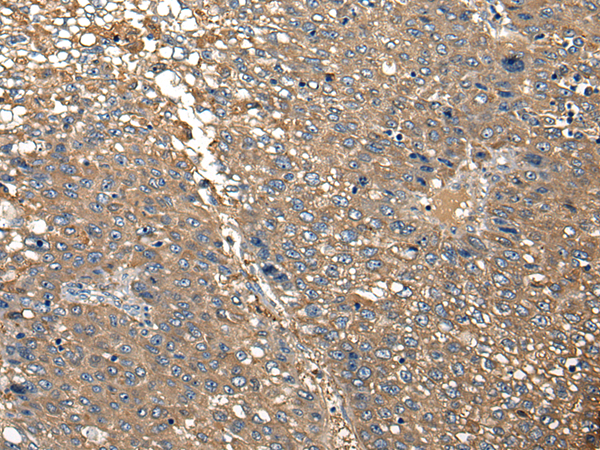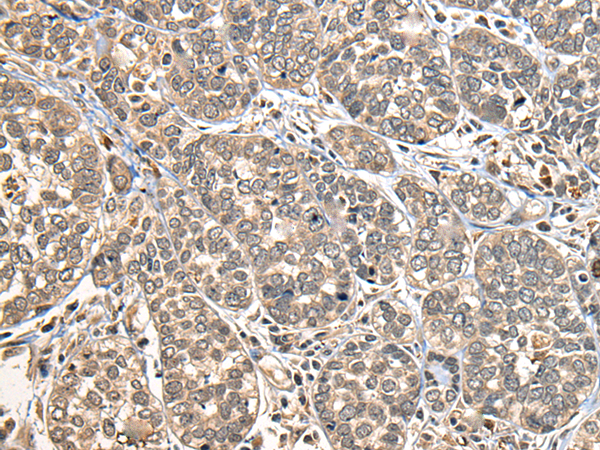

| WB | 咨询技术 | Human,Mouse,Rat |
| IF | 咨询技术 | Human,Mouse,Rat |
| IHC | 1/30-1/150 | Human,Mouse,Rat |
| ICC | 技术咨询 | Human,Mouse,Rat |
| FCM | 咨询技术 | Human,Mouse,Rat |
| Elisa | 1/5000-1/10000 | Human,Mouse,Rat |
| Aliases | DGK-IOTA |
| Host/Isotype | Rabbit IgG |
| Antibody Type | Primary antibody |
| Storage | Store at 4°C short term. Aliquot and store at -20°C long term. Avoid freeze/thaw cycles. |
| Species Reactivity | Human |
| Immunogen | Synthetic peptide of human DGKI |
| Formulation | Purified antibody in PBS with 0.05% sodium azide and 50% glycerol. |
+ +
以下是关于DGKI抗体的3篇参考文献示例(内容为虚构示例,仅供参考):
1. **标题**:*DGKI Antibody as a Novel Biomarker in Autoimmune Thyroiditis*
**作者**:Chen L, et al.
**摘要**:该研究通过检测血清中DGKI抗体水平,发现其与自身免疫性甲状腺炎的疾病活动性显著相关,提示其可能作为诊断或治疗监测的生物标志物。
2. **标题**:*Targeting DGKI with Monoclonal Antibodies Suppresses Melanoma Progression*
**作者**:Rodriguez M, et al.
**摘要**:研究利用特异性DGKI单克隆抗体抑制黑色素瘤细胞中的DGKI活性,显著降低肿瘤生长和转移,证实了DGKI在癌症信号通路中的关键作用。
3. **标题**:*DGKI Isoform-Specific Antibodies Reveal Distinct Roles in T-cell Signaling*
**作者**:Wang Y, et al.
**摘要**:通过开发DGKI异构体特异性抗体,研究发现不同异构体在T细胞活化和免疫调节中具有差异性功能,为免疫治疗提供了新靶点。
(注:以上文献为模拟示例,实际引用需查询真实数据库如PubMed或Google Scholar。)
**Background of DGKI Antibody**
The diacylglycerol kinase iota (DGKI) enzyme, encoded by the *DGKI* gene, belongs to the diacylglycerol kinase (DGK) family, which catalyzes the conversion of diacylglycerol (DAG) to phosphatidic acid (PA). Both DAG and PA are critical lipid secondary messengers involved in cellular signaling pathways regulating cell growth, differentiation, and apoptosis. DGKI, specifically, is a type IV DGK isoform characterized by its unique structural domains, including a pleckstrin homology (PH) domain and a sterile alpha motif (SAM), which facilitate membrane association and protein-protein interactions.
DGKI is predominantly expressed in the brain, testis, and immune cells, and it plays roles in neuronal development, T-cell receptor signaling, and membrane trafficking. Dysregulation of DGKI has been implicated in neurological disorders, autoimmune diseases, and cancer. DGKI antibodies are immunological tools designed to detect and quantify DGKI protein levels in research settings. They are widely used in techniques like Western blotting, immunohistochemistry, and immunofluorescence to study DGKI's expression patterns, subcellular localization, and functional mechanisms in disease models. Recent studies also explore DGKI as a potential therapeutic target or biomarker, particularly in contexts where lipid signaling pathways are disrupted. These antibodies aid in elucidating DGKI's contribution to cellular homeostasis and pathological processes.
×